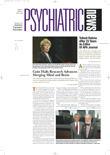The Family Opportunity Act (FOA) cleared a major hurdle in Congress last month when the Senate passed the legislation more than three years after it was introduced.
“APA is thrilled that after months of advocacy efforts, the Senate passed this much-needed measure,” Lizbet Boroughs, an associate director in the APA Department of Government Relations, told Psychiatric News.“ Along with three dozen national family, children's, professional, and other advocacy groups, we look forward to passage by the House and the president's signature on FOA.”
Sponsored by Sen. Charles Grassley (R-Iowa) and cosponsored by Sen. Edward Kennedy (D-Mass.) and 65 other senators, the bill would allow families with annual incomes of up to 250 percent of the federal poverty level ($47,125 for a family of four) to buy into Medicaid to obtain care for their disabled children, according to the May 7 Kaiser Health Policy Daily Report.
Medicaid offers more comprehensive benefits for disability-related services than most private health plans. Supporters of the bill say that many families with disabled children are forced to turn down pay raises and take other steps to keep their income low enough to maintain Medicaid eligibility, according to the report.
Last year, the General Accounting Office identified gaps in insurance coverage as a key factor in parents' relinquishment of child custody as a way to obtain Medicaid-funded mental health services, according to a May 7 Bazelon Center action alert.
The FOA would also allow children with serious mental illnesses to receive services in their homes or communities if they are at risk of being placed in a residential treatment center or already receiving services in such a facility.
On the basis of their income, families that qualify for Medicaid coverage under the new legislation would be charged premiums by the state on a sliding-scale basis. The Medicaid and private insurance premiums combined could not exceed 8 percent of family income, according to the Bazelon report.
The legislation would cost about $7 billion over 10 years and is likely to face opposition in the House of Representatives from fiscal conservatives concerned about expanding Medicaid. At press time Grassley planned to talk to House Speaker Dennis Hastert (R-Ill.) about bringing the House bill (HR 1811) to a floor vote before the Memorial Day recess.
The Family Opportunity Act can be accessed online at<http://thomas.loc.gov> by searching on the respective bill number, S 622 or HR 1811.▪
